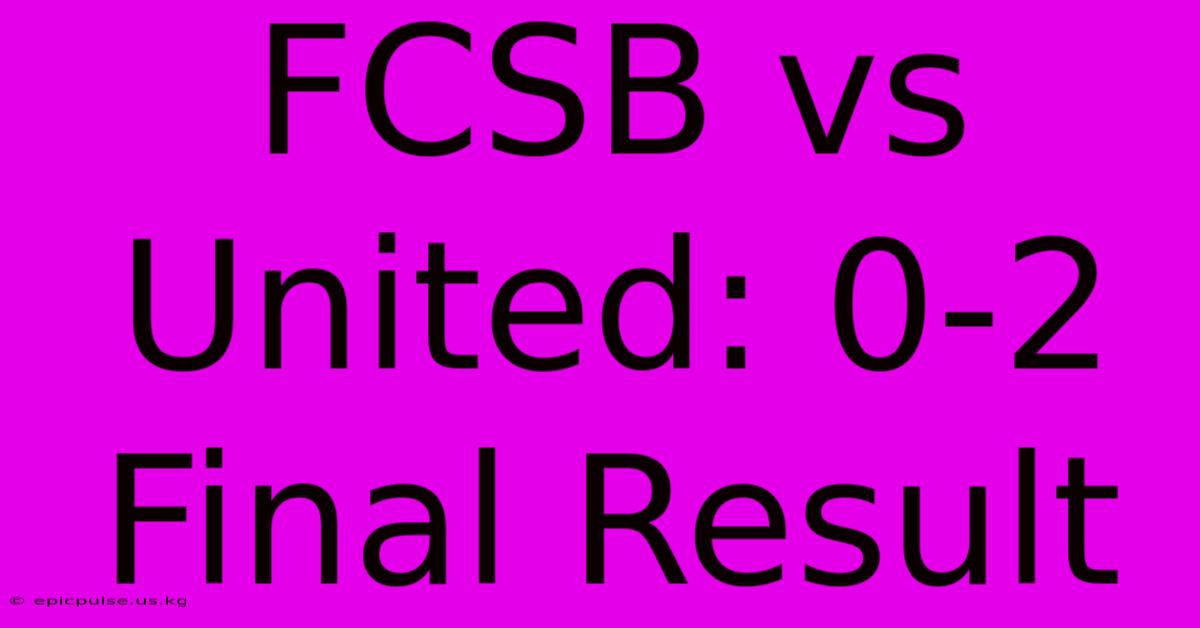FCSB Vs United: 0-2 Final Result

Discover more detailed and exciting information on our website. Click the link below to start your adventure: Visit Best Website epicpulse.us.kg. Don't miss out!
Table of Contents
FCSB vs. Manchester United: A 0-2 Defeat, But Lessons Learned
The final whistle blew at the Arena Națională, echoing the 0-2 defeat suffered by FCSB at the hands of Manchester United. While the scoreline might seem straightforward, the match itself was a tapestry woven with moments of both frustration and promise for the Romanian giants. This analysis delves deep into the game, dissecting the key tactical decisions, individual performances, and the overall implications of the result.
A Dominant Display from Manchester United
From the outset, Manchester United displayed a clear intent to control the game. Their midfield dominance, spearheaded by [mention key midfield players and their impactful actions e.g., Casemiro's defensive solidity and Bruno Fernandes' creative distribution], stifled FCSB's attempts to build any meaningful attacking momentum. United's high press, effectively disrupting FCSB's passing lanes, forced errors and created turnovers which were expertly capitalized upon. The Red Devils' superior physicality was also evident, particularly in midfield battles where they consistently won second balls and disrupted FCSB's rhythm.
Tactical Masterclass from Ten Hag?
Manager Erik ten Hag's tactical setup proved highly effective. The utilization of [mention specific formations and player positioning, e.g., a 4-2-3-1 with wing-backs providing width and support] provided both defensive solidity and attacking fluidity. The team's ability to seamlessly transition between defense and attack, maintaining possession effectively when necessary and launching swift counter-attacks when opportunities arose, highlighted the effectiveness of Ten Hag's game plan. This tactical discipline and flexibility proved too much for FCSB to handle.
Clinical Finishing Decides the Match
While Manchester United controlled possession and created numerous chances, their clinical finishing in front of goal ultimately sealed the victory. [Discuss the goals scored, highlighting the build-up play, the individual brilliance of the goal-scorers, and the defensive lapses that allowed the goals. For example: "Rashford's first-half strike, a stunning curler from outside the box, showcased his individual quality and exposed a momentary lapse in FCSB's defensive organization."]. These goals, showcasing precision and composure under pressure, underscored the difference in quality between the two teams.
FCSB's Struggle for Control
FCSB, despite their valiant efforts, struggled to cope with Manchester United's intensity and tactical acumen. Their attempts to break down the United defense often lacked creativity and incisiveness. The midfield battle, in particular, was lost, hindering their ability to supply their attacking players with the necessary service.
Defensive Fragility Exposed
FCSB's defense, while showing moments of resilience, ultimately proved vulnerable against the attacking prowess of Manchester United. [Analyze the defensive performance, identifying specific weaknesses and highlighting individual errors. For example: "The full-backs struggled to contain the overlapping runs of United's wing-backs, while the central defenders were occasionally caught out of position, leaving gaps for United's attackers to exploit."]. The inability to maintain a consistent defensive shape and to effectively deal with United's dynamic attacking movements significantly contributed to the defeat.
Lack of Clinical Finishing
FCSB's attacking play, while not completely toothless, lacked the clinical edge needed to trouble David de Gea. While they created a few half-chances, the final pass or shot often lacked precision, failing to test the United goalkeeper seriously. This lack of composure in front of goal underscored the difference in experience and quality between the two squads. Improving finishing accuracy should be a key focus for future matches.
Post-Match Analysis and Future Prospects
The 0-2 defeat, while undoubtedly disappointing for FCSB, should not overshadow the valuable experience gained against a top-tier European opponent. The match provided valuable lessons on the level of intensity, tactical sophistication, and individual quality required to compete at the highest level.
Key Areas for Improvement
FCSB must focus on several key areas for future improvement. These include:
- Strengthening the midfield: Improving the midfield's ability to control possession, disrupt opponents, and supply the attackers is crucial.
- Defensive solidity: Addressing defensive vulnerabilities and improving communication and organization at the back is paramount.
- Clinical finishing: Improving the team's ability to convert chances into goals is essential for future success.
- Tactical adaptability: Developing greater tactical flexibility to adapt to different opponents and game situations will be crucial.
Long-Term Vision
This match, while a loss, serves as a valuable learning experience. FCSB can utilize this setback as a catalyst for future growth, refining their tactical approaches and improving individual skills to better compete on the European stage. The club's long-term vision should focus on developing youth talent, strengthening their squad strategically, and continuing to invest in improved coaching and infrastructure.
Conclusion: A Valuable Learning Experience
The 0-2 defeat against Manchester United was a stark reminder of the gap between FCSB and the elite teams in European football. However, the match also provided a platform for valuable learning and growth. By carefully analyzing their performance, identifying areas for improvement, and continuing to invest in their development, FCSB can transform this setback into a stepping stone toward future success. The road ahead is challenging, but the potential for growth and improvement is evident. The spirit of competition displayed by FCSB, despite the result, deserves recognition, and their future prospects, with the right approach, are promising.

Thank you for visiting our website wich cover about FCSB Vs United: 0-2 Final Result. We hope the information provided has been useful to you. Feel free to contact us if you have any questions or need further assistance. See you next time and dont miss to bookmark.
Also read the following articles
| Article Title | Date |
|---|---|
| Fcsb Manchester United Live Europa League | Feb 01, 2025 |
| Obituary Marianne Faithfull 78 Passes Away | Feb 01, 2025 |
| Faithfulls Resilience A Life Unwavering | Feb 01, 2025 |
| Tucker Accused Of Sexual Misconduct | Feb 01, 2025 |
| Singer Marianne Faithfull Passes Away | Feb 01, 2025 |
